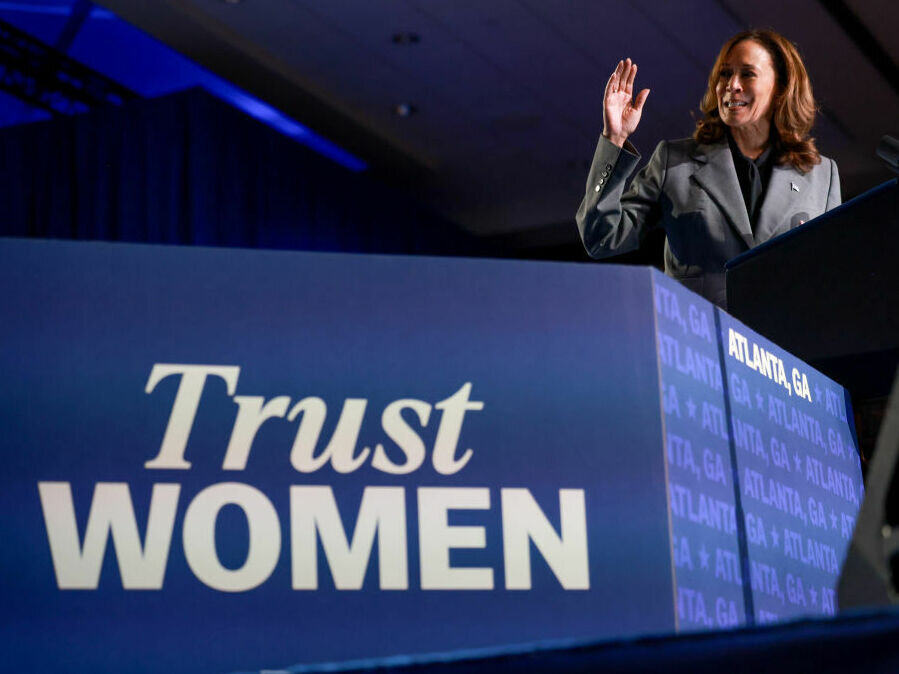
Democratic presidential nominee, U.S. Vice President Kamala Harris, speaks during an event at the Cobb Energy Performing Arts Centre on September 20, 2024, in Atlanta, Georgia.
Joe Raedle/Getty Images
Joe Raedle/Getty Images
A few months ago, it was looking like Donald Trump had Georgia all but locked up.
Then President Joe Biden dropped out of the election, and Vice President Kamala Harris jumped in, saying in one of her first speeches:
“I am very clear: The path to the White House runs right through this state.You all helped us win in 2020, and we’re going to do it again in 2024.”
Now Georgia is once again in play for democrats. But the state has never elected a female Governor or a female U.S. senator. Will that fact determine who might win their 16 electoral votes?
You’re reading the Consider This newsletter, which unpacks one major news story each day. Subscribe here to get it delivered to your inbox, and listen to more from the Consider This podcast.
A roundtable with residents.
Consider This host Mary Louise Kelly sat down with three longtime Georgia residents to hear their thoughts on where their home state could go in this election.
She sat in a cafe in Atlanta this past week with Latrice Cushenberry, Eustacia McCloud Carter and Donna Smith Aranson.
The three women come from different backgrounds, different religions and different races. They range in age from their 50s to their 70s.
What they have in common is they are all backing Kamala Harris for president.
So why are they all in for Harris? To Cushenberry, it’s about values, and seeing herself and her family in the candidate.
“She is someone that I have seen repeatedly throughout my lifetime in my grandmother, my mother, my aunts – [a] capable, competent, African American person that basically can get the job done with empathy and compassion,” she told NPR.
For Aranson, it was a hope for change, as a native Atlantan who has lived through many political cycles in the city, and a rotation of both Republican and Democratic governors.
“When Kamala stepped up, it was like a lightning bolt,” she said. “I listened to President Biden as he stepped back and turned the reins over to Kamala. And I said, ‘This is it. This has got to be it.'”
For Carter, the choice wasn’t so obvious from the very beginning. She first had to move past the fact that she was ready for another term for Biden.
“I wasn’t kumbaya and jumping up and screaming when Joe Biden stepped down because I was all in for Joe Biden. I didn’t care if we had to put him in a wheelchair, motorized, five oxygen tanks on his back. I was all in [for] Joe Biden,” she explained.
“It wasn’t that I wasn’t going to ever vote for Kamala. I knew I was going to vote for Kamala. I’m a staunch Democrat. I fall in line with the party. So she was going to get my vote. She’s qualified and not just because she’s a woman. She’s a qualified individual. Her resume speaks for itself. And, yes, she can be president.”
Hopes for the future.
Harris’ campaign hasn’t spent much time or energy focusing on the historic nature of her possible presidency.
Aranson says that she thinks it’s the right choice.”When she wins – and it’s a when, not an if – she will be the president of all the people. And I think she has to appeal to all people, all genders, all religions,” she said.
“I think the stance on abortion and all of the things that matter to women specifically are strong issues that she backs. And that’s not to say that men don’t either, but it’s feels more personal when it comes from a woman – and a strong woman.”
As for the question of if Georgia can elect a woman to power? Cushenberry says yes – and looks to the younger generations as to why.
“There’s a brand-new demographic in this election: the young people who grew up during the age of school shootings. Those children are exhausted. They went through COVID. When they went back to school, there were so many threats. They’re ready for change, and I am ready for the change that they are ushering in,” she said.
This episode was produced by Kira Wakeam, Erika Ryan and Alejandra Marquez Janse, with audio engineering by Tiffany Vera Castro. It was edited by Courtney Dorning. Our executive producer is Sami Yenigun.


